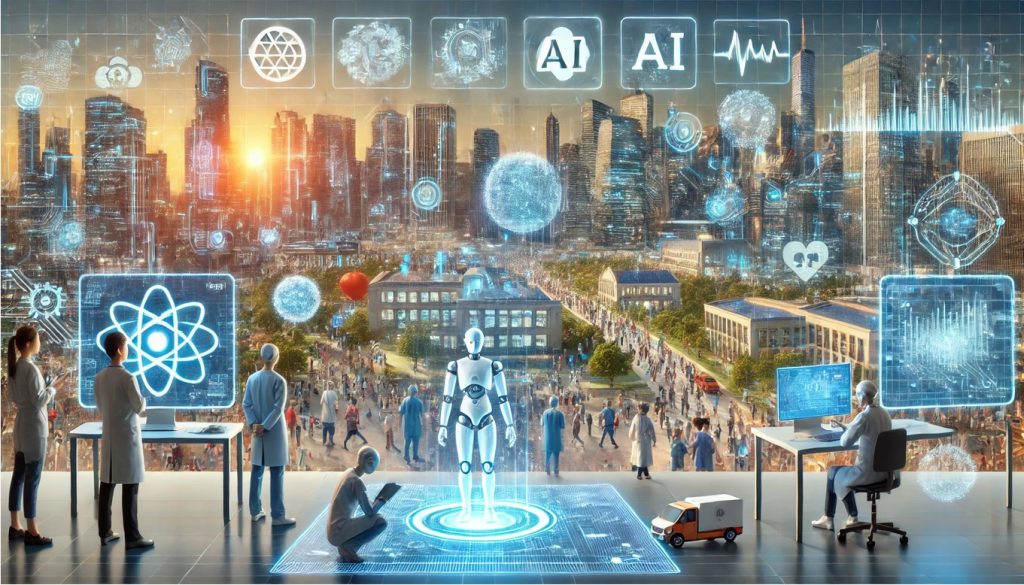In recent years, China has emerged as a global leader in the field of artificial intelligence (AI), making significant strides in research, development, and deployment of AI technologies across various industries. The country’s rapid advancement in AI is driven by a combination of government support, robust investment in research and innovation, an expansive consumer market, and a thriving digital economy. As part of its ambitious plans for economic modernization, China has identified AI as a key pillar of its future technological development and economic competitiveness, aiming to become the world’s AI innovation hub by 2030.
AI in China encompasses a broad spectrum of technologies and applications, ranging from machine learning and natural language processing (NLP) to robotics, autonomous vehicles, and AI in healthcare. China’s AI ecosystem is also supported by its vast data resources, growing pool of AI talent, and robust private sector, including technology giants like Baidu, Alibaba, Tencent, and newer startups in AI and big data. These elements have enabled China to not only compete with the leading AI nations, including the United States, but in many instances, to outpace them in certain areas such as facial recognition, AI in manufacturing, and applications in public security.
Government Policies and Strategic Vision for AI
National AI Strategy
China’s government has played a crucial role in positioning the country as a global leader in AI development. The Chinese government’s AI strategy can be traced back to the release of its Next Generation Artificial Intelligence Development Plan in July 2017. This ambitious blueprint laid out a comprehensive roadmap for China’s AI development with the goal of making the country the world’s AI innovation center by 2030. It outlines a series of goals aimed at enhancing AI research, fostering innovation, accelerating the integration of AI technologies across industries, and improving AI’s contribution to China’s economic growth and competitiveness.
The AI development plan emphasizes the importance of developing core AI technologies, such as machine learning, natural language processing, and neural networks. It also stresses the need for breakthroughs in AI applications, particularly in key sectors like healthcare, manufacturing, transportation, and finance. Moreover, the plan highlights the importance of cultivating AI talent and building an infrastructure that can support AI innovation, such as data-sharing platforms, AI research institutes, and partnerships between academia, government, and industry.
Policies Supporting AI Research and Development
To execute its AI strategy, China has rolled out a range of policy measures designed to encourage investment in AI research and development, foster innovation, and streamline regulatory processes. These policies include substantial government funding for AI research, tax incentives for AI startups, and the establishment of AI research hubs across the country. The Chinese government has also made investments in AI talent development by funding AI programs at universities and research institutions.
Additionally, China’s focus on building a data-driven economy has been central to its AI policy. The country has relaxed data privacy and data-sharing regulations in order to promote the collection and utilization of big data, which is critical for training AI models. This policy of less stringent data protection has provided Chinese AI companies with unparalleled access to massive datasets, which are used to train machine learning models and improve AI capabilities in areas such as facial recognition, language processing, and autonomous systems.
Funding and Collaboration Initiatives
To support the rapid development of AI technologies, China has heavily invested in AI-related venture capital (VC) funds, research institutes, and innovation-driven economic zones. The country has also fostered collaboration between the public and private sectors, particularly through partnerships between tech companies, universities, and government agencies.
The creation of “AI parks” and innovation hubs in cities like Beijing, Shanghai, Shenzhen, and Hangzhou has provided a nurturing environment for AI startups, research organizations, and established tech companies. These hubs offer funding, resources, and access to industry experts, helping China’s AI ecosystem flourish.
China has also sought to attract top international talent and foster international collaboration. The government has actively supported initiatives to bring in AI researchers and experts from abroad to boost the country’s innovation capacity.
AI Technologies and Key Research Areas in China
Machine Learning and Deep Learning
Machine learning (ML) and deep learning (DL) are two of the most widely utilized AI technologies in China, with applications spanning several key sectors, including finance, healthcare, and e-commerce. In particular, the Chinese government and private sector have made significant investments in deep learning, a subset of machine learning that involves neural networks with many layers of processing.
Deep learning has been the foundation for advancements in computer vision, natural language processing, and speech recognition. With access to vast amounts of data from various sources—including social media, e-commerce platforms, and government databases—China has been able to train deep learning models that outperform those of other countries in specific areas, such as facial recognition and image classification.
Leading Chinese AI companies, such as Baidu, Alibaba, and Tencent, have made major contributions to deep learning research, with Baidu in particular being at the forefront of developing AI-based speech recognition systems and autonomous driving technology.
Natural Language Processing (NLP)
Natural language processing (NLP) is another key area of AI development in China. NLP focuses on enabling machines to understand and process human languages, which has vast applications in voice-activated assistants, sentiment analysis, language translation, and customer service.
Baidu and Alibaba have invested heavily in NLP technologies, particularly in developing voice recognition systems. Baidu’s AI-powered voice assistant, DuerOS, and Alibaba’s AliMe chatbot are examples of how NLP is transforming user interactions in the Chinese market. In addition, Tencent’s WeChat employs NLP to process and understand user queries, improve search capabilities, and facilitate business functions.
China’s AI companies are also making strides in NLP research for specific dialects and languages, making significant progress in Mandarin Chinese, Cantonese, and other local dialects. This focus on linguistic diversity has allowed China to address the unique challenges of NLP in a country with multiple dialects and regional variations.
Computer Vision and Facial Recognition
One of the most prominent applications of AI in China is computer vision, particularly in facial recognition. Chinese companies have been leading the development of facial recognition technology, which has been widely deployed in areas such as security, retail, and public services.
Facial recognition technology is used extensively in China’s public security systems, where it aids in surveillance, criminal investigations, and even in the identification of individuals in public spaces. Chinese tech companies, such as SenseTime and Megvii, have developed some of the world’s most advanced facial recognition systems, leveraging AI to analyze and compare facial features in real time.
Beyond security, computer vision is also being used in retail environments. For example, Alibaba has deployed computer vision technology to improve the shopping experience in its “New Retail” stores, where customers can use facial recognition to pay for purchases without the need for a physical checkout.
Autonomous Vehicles
Autonomous driving is one of the most promising and competitive areas of AI development in China. The Chinese government has recognized the importance of AI in the transportation sector and has put in place policies to promote the development of self-driving vehicles.
Baidu’s Apollo project is one of the most well-known efforts in China’s autonomous vehicle space. Apollo is an open-source platform for autonomous driving, providing software, hardware, and data services to car manufacturers and technology companies. In addition to Apollo, other companies like Tencent and Alibaba are also heavily involved in AI-driven smart mobility solutions, including autonomous delivery robots, electric vehicles (EVs), and smart transportation infrastructure.
China has also been testing autonomous vehicles on public roads in cities like Beijing and Shanghai, while regulatory bodies are working to create a framework for the commercial deployment of self-driving cars.
Robotics and Automation
AI-powered robotics is another area where China has made significant progress. Chinese companies are leading the development of intelligent robots for various industries, including manufacturing, logistics, and healthcare. Companies like DJI and UBTech are developing autonomous drones, robots, and other automation technologies that have applications ranging from package delivery to industrial inspection and surgery.
The Chinese government has supported the development of robotics by investing in research and fostering partnerships between universities, government agencies, and private companies. Robotics is also a key component of China’s “Made in China 2025” initiative, which aims to modernize the country’s manufacturing sector through the integration of smart technologies and automation.
Applications of AI in China’s Key Industries
AI in Healthcare
One of the most promising applications of AI in China is in the healthcare sector. The Chinese government has recognized the potential of AI to address the challenges of an aging population, the shortage of medical professionals, and the need for more efficient healthcare services.
AI is being applied in various areas of healthcare, from medical imaging to drug discovery and precision medicine. Chinese AI companies, such as Ping An Good Doctor and Baidu, are using AI to assist doctors in diagnosing diseases, analyzing medical images, and even providing personalized treatment recommendations.
In the field of medical imaging, AI algorithms are being used to identify early signs of diseases like cancer, tuberculosis, and diabetic retinopathy, helping doctors make faster and more accurate diagnoses. AI-powered health management platforms, such as Tencent’s WeChat health services, are also being deployed to monitor patients’ health and provide real-time health advice through chatbots.
AI in Finance
The financial services sector in China is one of the largest adopters of AI technologies. AI has been deployed in areas like risk management, credit scoring, algorithmic trading, and fraud detection. Chinese fintech companies, including Ant Group (Alibaba), JD Digits (JD.com), and Tencent, have been leading the way in applying AI to improve financial services.
In credit scoring, AI models analyze vast amounts of consumer data, including transaction history and social behavior, to predict an individual’s creditworthiness. AI is also used to detect and prevent financial fraud by identifying unusual patterns in transactions and flagging potentially fraudulent activities.
Moreover, AI-driven robo-advisors are gaining popularity in China’s wealth management market, providing personalized investment advice and portfolio management services to retail investors.
AI in Manufacturing and Industry 4.0
AI is playing an increasingly important role in transforming China’s manufacturing sector, especially in the context of Industry 4.0—the next phase of industrialization characterized by smart factories, automation, and data-driven production systems. AI technologies, such as predictive maintenance, supply chain optimization, and quality control, are being integrated into manufacturing processes to improve efficiency and reduce costs.
In the automotive industry, AI is being used in the design and production of vehicles, while in the electronics sector, AI-driven robots are streamlining assembly lines and improving production processes. Companies like Huawei and Haier are at the forefront of deploying AI and IoT technologies to create smart factories that use machine learning to optimize production schedules, reduce downtime, and ensure product quality.
Challenges and Future Prospects
Ethical and Regulatory Challenges
Despite its impressive progress, China faces significant challenges in AI development. Ethical concerns regarding privacy, surveillance, and data security are among the most pressing issues. The widespread use of AI in surveillance has raised concerns about the balance between national security and individual freedoms, particularly in light of the Chinese government’s use of AI-powered facial recognition technology for social control.
Additionally, there are challenges related to the regulation of AI technologies, particularly as they impact jobs, privacy, and human rights. As AI becomes more integrated into society, China will need to establish clear guidelines for responsible AI development and use.
International Competition and Global Cooperation
Although China is making significant strides in AI, it faces fierce competition from other AI powerhouses, particularly the United States. Global competition in AI innovation and talent is intensifying, and China must continue to foster an environment conducive to international collaboration while also addressing its intellectual property concerns.
Looking ahead, China will likely continue to invest in cutting-edge AI research, cultivate homegrown talent, and address the challenges associated with AI implementation. Whether China can meet its ambitious AI goals will depend on its ability to manage these challenges while continuing to push the boundaries of technological innovation.







